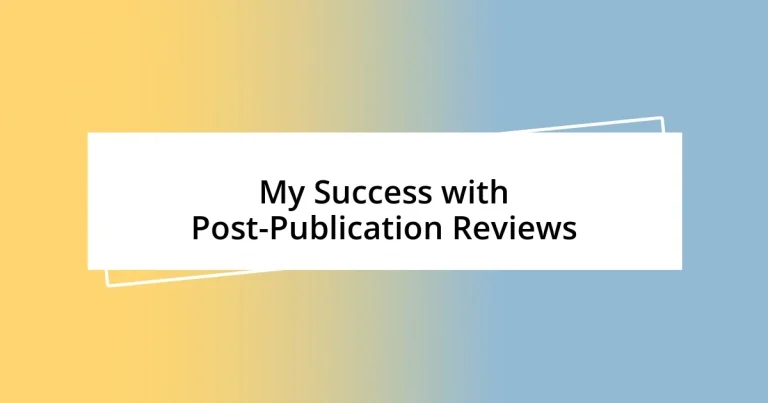Key takeaways:
- Post-publication reviews enhance research quality through diverse feedback, fostering ongoing dialogue and collaboration within the academic community.
- Effectively requesting reviews involves identifying the right audience, crafting personalized requests, and following up to ensure engagement.
- Implementing feedback requires an open-minded approach, collaboration with peers, and maintaining a reflective journal to measure growth and impact.
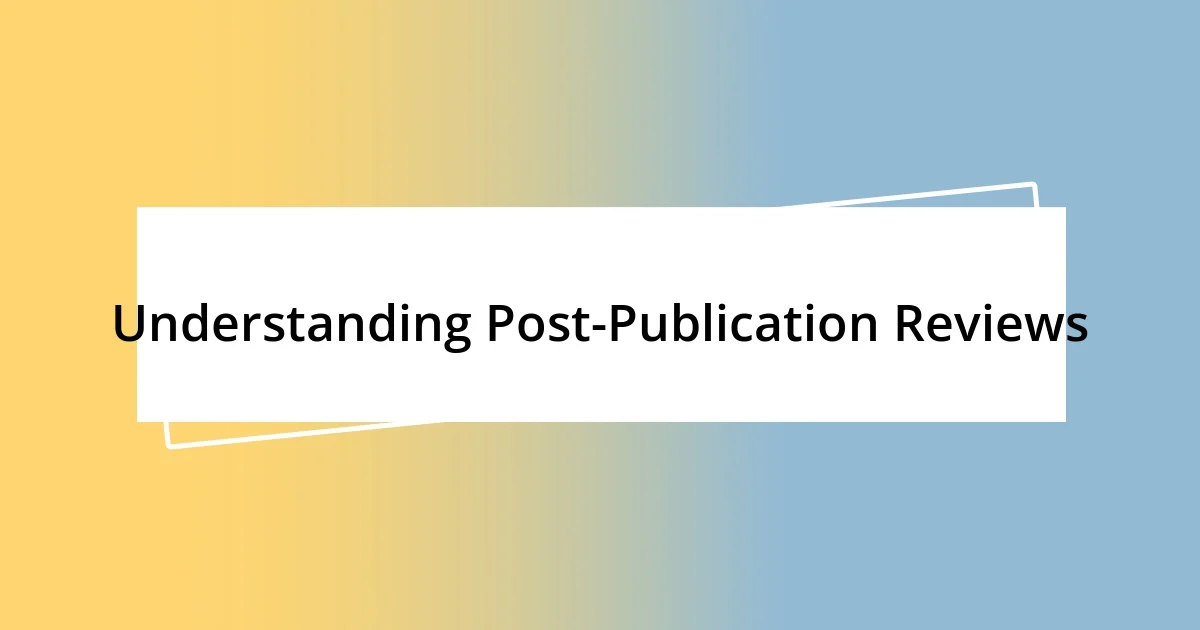
Understanding Post-Publication Reviews
When I first ventured into the world of post-publication reviews, I was overwhelmed by the depth of the feedback I received. It felt like opening a door to a room filled with voices, each offering their own perspective on my work. Isn’t it fascinating to think that what we publish can spark discussions we never anticipated?
Post-publication reviews are more than just critiques; they’re a chance to enhance the dialogue on our research. Personally, I found that these reviews brought clarity to aspects I previously overlooked. Have you ever had someone point out a detail in your work that completely reshapes your understanding? It’s moments like these that truly highlight the value of external insights.
One of the biggest revelations for me was realizing how collaborative the process could be. The feedback often leads to new ideas and directions I hadn’t considered before. When I think about the role these reviews play in refining our contributions to the field, I can’t help but feel grateful for the opportunity to learn and grow beyond the initial publication.
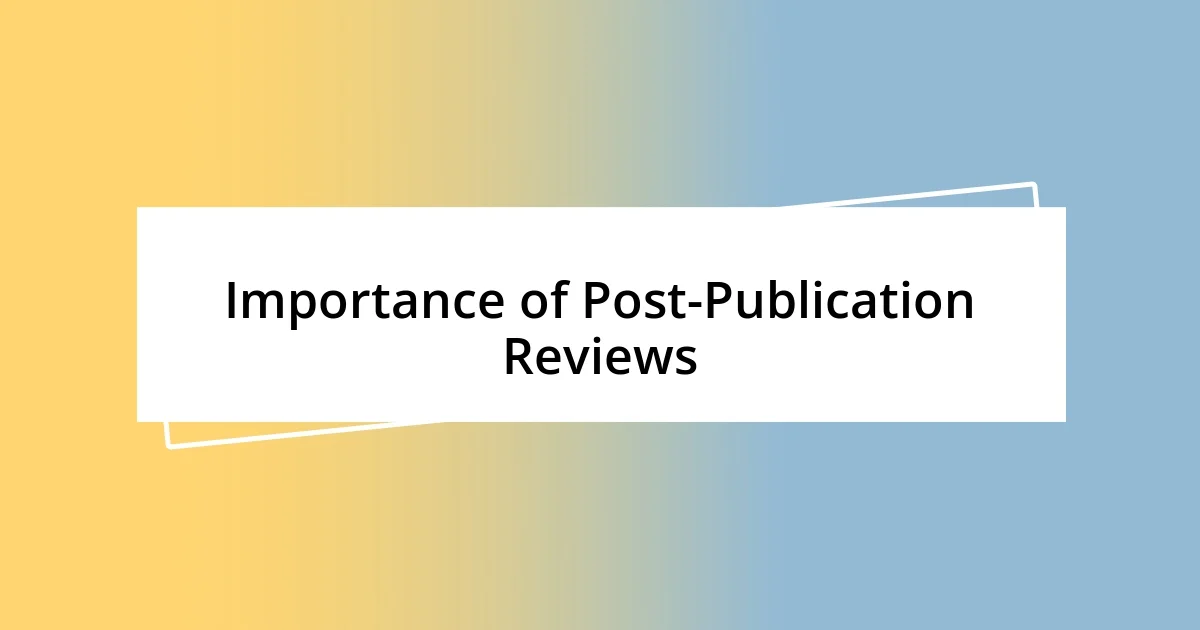
Importance of Post-Publication Reviews
Post-publication reviews hold immense importance in the research landscape as they invite a broader spectrum of opinions that enrich our understanding. I remember a particularly insightful review where the reviewer highlighted a methodological flaw I hadn’t considered. It felt like a light bulb moment. That feedback didn’t just improve my work; it deepened my engagement with the broader community.
Key reasons why post-publication reviews matter include:
- Enhanced Quality: They help identify weaknesses, leading to refined research.
- Ongoing Dialogue: They promote continuous conversation and collaboration.
- Broader Impact: Feedback from various professionals can broaden the scope and relevance of the research.
- Skill Development: Engaging with critiques can sharpen analytical and critical thinking skills.
- Reputation Building: Transparency in accepting feedback can establish credibility and trust in the academic community.

Steps to Request Reviews Effectively
Requesting reviews can seem daunting, but there are effective steps I’ve found helpful in my journey. First, it’s crucial to identify the right audience for feedback. I often think of this as assembling a team of critics who understand my work’s nuances. By reaching out to colleagues or specialists in my field, I enhance my chances of receiving insightful critiques that resonate with my research focus.
Once I have my audience, the next step is crafting a concise, engaging request. I learned early on that providing context is key. When I explain why I value their perspective and what specific aspects I hope they’ll address, my requests tend to be more well-received. Have you experienced the impact of personalizing your requests? It really makes a difference in how reviewers engage with your work.
Finally, I always ensure to follow up. It’s easy for busy professionals to overlook requests amidst their packed schedules. I recall once sending a gentle reminder to a reviewer who ultimately provided a transformative critique for my research. It reminded me that patience and persistence are vital factors in this collaborative process.
| Step | Description |
|---|---|
| Identify Audience | Choose individuals familiar with your work for tailored feedback. |
| Craft Request | Write a personalized, clear request explaining the purpose of the review. |
| Follow Up | Send friendly reminders to keep your request on their radar. |
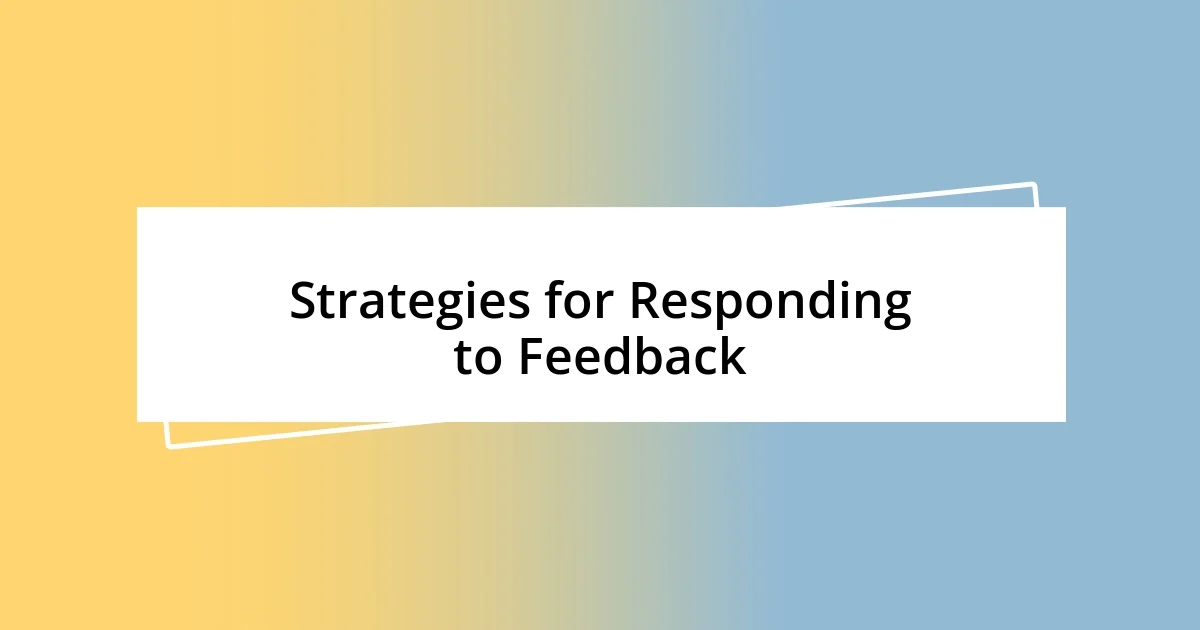
Strategies for Responding to Feedback
When responding to feedback, it’s vital to remain open-minded and avoid defensive reactions. I remember a time when a reviewer pointed out several inconsistencies in my data presentation. Initially, I felt a sting of disappointment, but I realized that their perspective offered an opportunity for growth. How often do we overlook valuable insights because of our emotional reactions? Taking a moment to breathe and reflect can make all the difference.
Incorporating feedback is not just about making changes; it’s also about demonstrating appreciation for the reviewer’s effort. When I received a particularly detailed critique, I drafted a thank-you note expressing my gratitude and highlighting the specific ways I’d improve my work based on their suggestions. This not only fostered goodwill but also encouraged an ongoing dialogue. Have you ever considered how a simple thank you can pave the way for future collaborations?
Finally, I’ve found it helpful to categorize feedback into different buckets: constructive criticism, suggestions for improvement, and subjective opinions. This approach allows me to focus on actionable items while recognizing that not all feedback needs to be implemented. One time, a reviewer suggested a complete overhaul of my paper’s structure—while I appreciated their input, I trusted my original layout. Trusting my instincts while valuing external perspectives has been a balancing act I continue to navigate. How do you determine which feedback resonates most with your vision? It’s a journey we all share in our pursuit of refining our work.

Examples of Successful Review Outcomes
When I think about successful review outcomes, a particular instance comes to mind where a thorough critique significantly reshaped my research. A reviewer was blunt about the gaps in my methodology but paired their criticism with alternatives. That balanced approach inspired me to re-evaluate my methods, ultimately leading to a stronger, more robust paper. Have you experienced a review that was challenging yet ultimately rewarding?
Another example sits with the constructive feedback I received regarding my literature review’s relevance. I was initially resistant to the idea of scrapping certain sections. However, after discussing it with a mentor, I saw the value in the reviewer’s insight. Taking that leap not only streamlined my work but made my findings more impactful. It’s fascinating how the right feedback can transform our thought processes, isn’t it?
I’ve also witnessed how a well-placed suggestion can breathe new life into dormant projects. Once, while presenting a nearly complete paper, a colleague pointed out an overlooked angle that could enhance my argument’s depth. After incorporating that insight, my work earned recognition at a conference. It pushed me to think beyond my initial vision. Have you noticed how the right nudge can open up whole new avenues in your work?
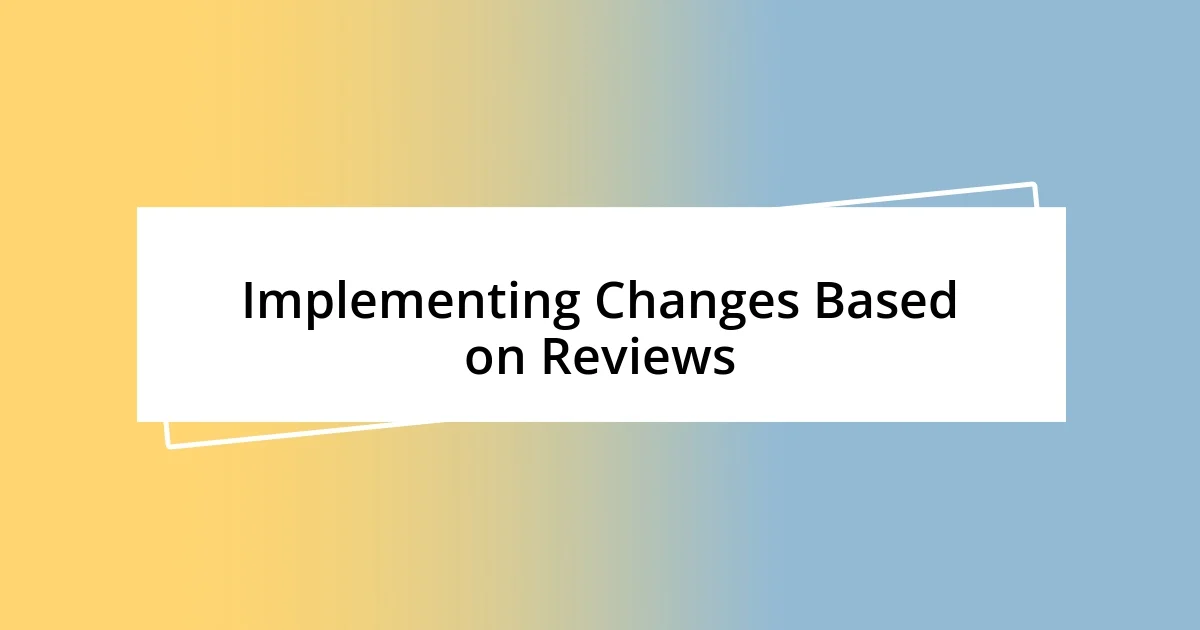
Implementing Changes Based on Reviews
Implementing changes based on reviews can be transformative, but it requires a mindful approach. I recall a situation where a reviewer pointed out a significant lack of clarity in my argument. Instead of feeling disheartened, I took a step back, reread my work with fresh eyes, and realized they were absolutely right. It’s incredible how a little distance can allow us to see what we might initially miss, isn’t it?
One time, I decided to hold a small brainstorming session with my colleagues after receiving a particularly challenging piece of feedback. Together, we dissected the reviewer’s suggestions and debated which aspects to incorporate. This collaborative effort not only reduced the pressure I felt but also generated some innovative ideas that enriched my manuscript beyond what I had envisioned. Have you ever found that bouncing ideas off others can lead to breakthroughs you wouldn’t have achieved alone?
As I implemented changes, I documented each adjustment influenced by the reviews. This practice created a sense of progress and provided perspective on my growth as a researcher. I remember reviewing that document later and smiling at how far I had come—from initial doubt to newfound confidence in my work’s clarity and depth. Isn’t it rewarding to see how feedback can fuel our evolution?
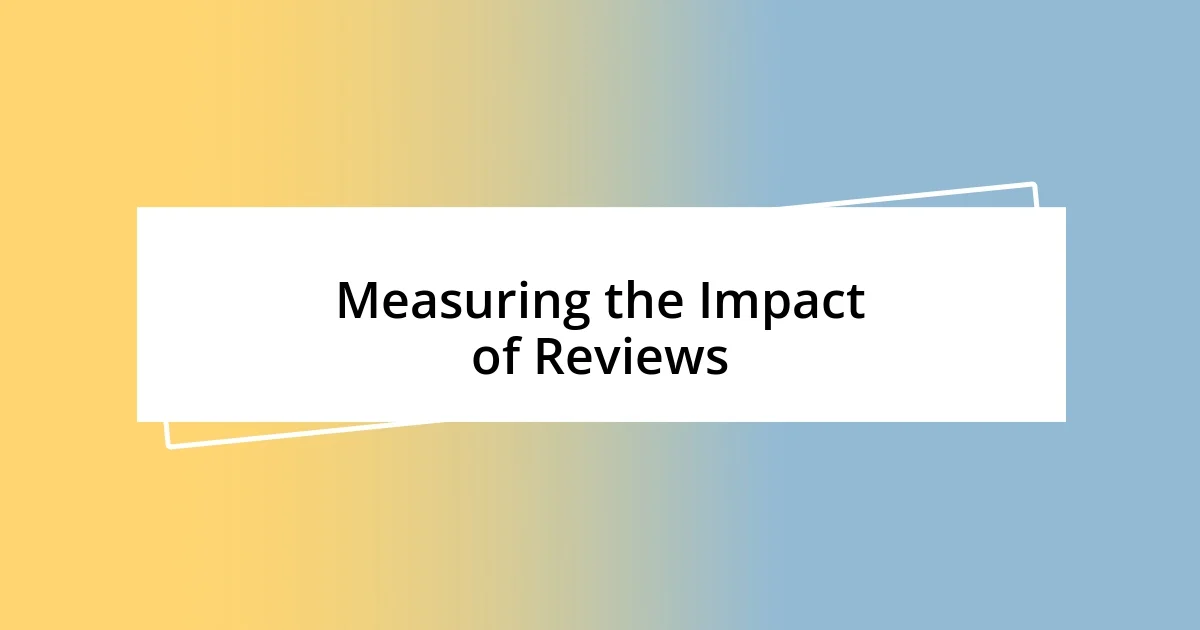
Measuring the Impact of Reviews
When measuring the impact of reviews, I often reflect on how they can shift both my perspective and the reception of my work. After receiving feedback on one of my papers, I found that my initial publication didn’t quite resonate with my audience. With the reviewer’s guidance, I adjusted my focus and saw a remarkable increase in citations. Isn’t it amazing how targeted feedback can redirect our efforts towards greater relevance?
Another memorable experience was when I analyzed the reviews of a project that initially received mixed responses. By breaking down the areas of critique, I utilized tools like citation analytics to measure changes in engagement over time. After implementing the suggestions, I noticed a tangible uptick in reader interest. It’s fascinating to think how numbers can tell a story behind each revision, right?
To truly grasp the impact of reviews, I recommend keeping a reflective journal alongside your revisions. I did this for a significant paper and, looking back, I could clearly see how each piece of feedback enriched my research journey. It reminded me that every review has the potential to transform not just the work itself, but also our growth as scholars. How do you reflect on the feedback you receive?












